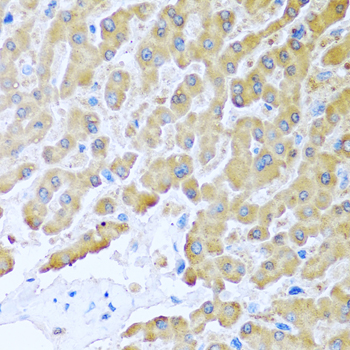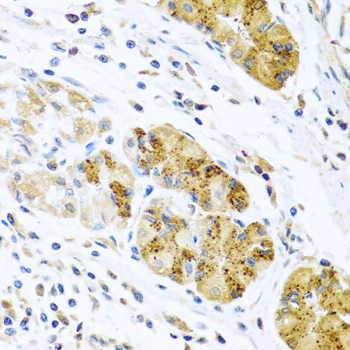Product Detail
Product NameCCL8 Rabbit Polyclonal Antibody
Host SpeciesRabbit
ClonalityPolyclonal
IsotypeIgG
PurificationAffinity purification
ApplicationsWB,IHC,IF
Species ReactivityHuman,Mouse
Immunogen DescRecombinant fusion protein of human CCL8 (NP_005614.2).
ConjugateUnconjugated
Other NamesCCL8;HC14;MCP-2;MCP2;SCYA10;SCYA8
Accession NoSwiss Prot:P80075
GeneID:6355
Uniprot
P80075
Calculated MW11kDa
FormulationBuffer: PBS with 0.02% sodium azide,50% glycerol,pH7.3.
StorageStore at -20˚C. Avoid freeze / thaw cycles.
Application Details
WB 1:500 - 1:2000
IHC 1:50 - 1:100
IF 1:50 - 1:100
Immunohistochemistry of paraffin-embedded human liver using CCL8 at dilution of 1:100 (40x lens).
Immunohistochemistry of paraffin-embedded human prostate cancer using CCL8 at dilution of 1:100 (40x lens).
Immunohistochemistry of paraffin-embedded human stomach using CCL8 at dilution of 1:100 (40x lens).
This antimicrobial gene is one of several chemokine genes clustered on the q-arm of chromosome 17. Chemokines form a superfamily of secreted proteins involved in immunoregulatory and inflammatory processes. The superfamily is divided into four subfamilies based on the arrangement of N-terminal cysteine residues of the mature peptide. This chemokine is a member of the CC subfamily which is characterized by two adjacent cysteine residues. This cytokine displays chemotactic activity for monocytes, lymphocytes, basophils and eosinophils. By recruiting leukocytes to sites of inflammation this cytokine may contribute to tumor-associated leukocyte infiltration and to the antiviral state against HIV infection.
If you have published an article using product 55062, please notify us so that we can cite your literature.
et al,Tumor-initiating cells escape tumor immunity via CCL8 from tumor-associated macrophages in mice.
, (2025),
PMID:
39774471





 Yes
Yes



